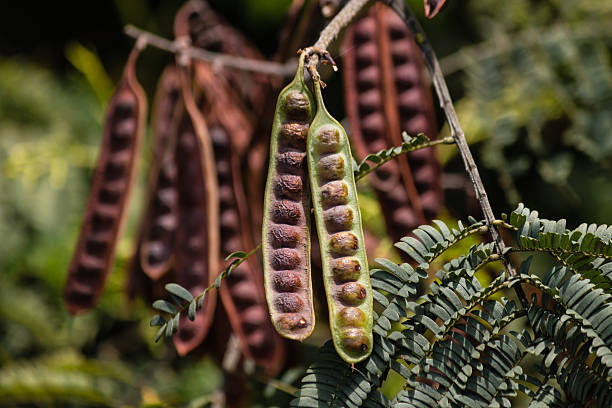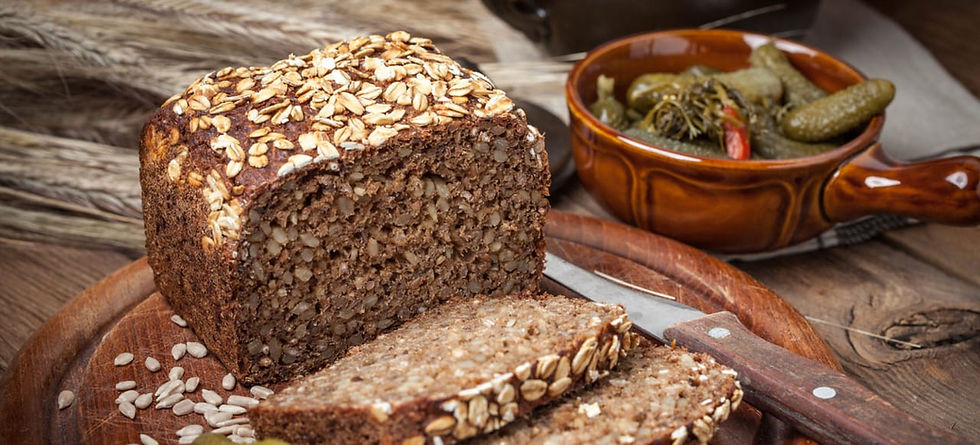6 Reasons Why Acacia Seeds Deserve a Spot in Your Diet
- Titilayo Abodunrin (Nutritionist)

- Jul 25, 2025
- 4 min read
Acacia seeds are small, hard seeds from various species of the Acacia tree. They exhibit bright shades of green (when unripe), yellow, or brown. They are found in tropical and subtropical regions around the world and their toughness allows them to flourish in environments unsuitable for many plants, making them an essential part of several ecosystems.

Acacia seeds are nutrient rich seeds, traditionally served as a food source popularly used as an ingredient in many dishes or as a traditional medicine to manage certain illnesses. In recent times, this seed is gaining more attention due to its nutritional and therapeutic potential as it offers diverse health benefits.
Nutritional Value of Acacia Seeds
Protein: Acacia seeds are an excellent source of plant-based protein as it contains approximately 20-28 grams. This makes them an ideal addition for vegetarians and vegans. Essential for muscle development, immune function, and tissue repair.
Dietary fiber: Acacia seeds contain nearly twice as much fiber as most common legumes with over 29-49 grams per 100 grams of acacia seeds. This high fiber content promotes digestive health by encouraging regular bowel movement and prevents constipation. It increases the feeling of fullness promoting satiety and it helps regulate blood sugar.
Healthy Fats: Acacia seeds contain fat ranging from 0.6-20%, depending on the species. It includes essential fatty acids beneficial for brain and heart health. In comparative studies of various legumes, some acacia seeds are classified as low-fat high-protein seeds, making them attractive for low-fat diets.
Vitamins and Minerals: They are rich in essential vitamins and minerals such as iron, calcium, magnesium, zinc, and potassium, which are vital for bone health, oxygen transport, and metabolic processes.
Phytochemicals: This Includes polyphenols, tannins, flavonoids, and saponins with antioxidant, antimicrobial, and anti-inflammatory effects.
These properties are what makes acacia seeds a promising ingredient in both traditional and modern diets.

Health Benefits of Acacia Seeds
Antioxidant Properties
Acacia seeds reduce oxidative stress by donating electrons to neutralize harmful free radicals, due to its polyphenolic and flavonoid contents. This antioxidant action helps protect cells from damage, slow aging, reduce inflammation and lower the risk of chronic diseases like cancer, diabetes, and cardiovascular disease.
Digestive Health
The high fiber content in acacia seeds offer significant benefits for digestive function as it improves nutrient absorption, may help prevent colon issues, support healthy gut bacteria, improve bowel movement and reduce constipation.
Additionally, some species of Acacia contain compounds that may protect the lining of the gastrointestinal tract, which may offers relief to gastric discomfort and peptic ulcers.
Weight Management
Due to its high fiber and protein content, along with their low glycemic index, acacia seed can keep you feeling full for a long time, making it easier to control portions and curb cravings.
With low glycemic index, acacia seeds reduce post-meal blood sugar spikes, which are often linked to increased fat storage and cravings. Fiber absorbs water and promotes a sense of fullness thereby, reducing overeating.
High protein content supports muscle maintenance, which is essential for maintaining a healthy metabolism during weight loss.
Anti-inflammatory and Antimicrobial Effects
Acacia seeds naturally combat inflammation and microbial infections, largely due to its rich content of bioactive compounds such as flavonoids, tannins, saponins, and polyphenols. Compounds like flavonoids and phenolic acids reduce inflammatory markers, which in turn reduces chronic inflammation.
Regular intake of anti-inflammatory foods like acacia seeds may help ease symptoms of inflammatory conditions such as arthritis and irritable bowel syndrome (IBS).
Antimicrobial effects inhibit the growth of harmful microorganisms, extracts from acacia seeds have shown antibacterial and antifungal activity against pathogens like E. coli or Staphylococcus aureus. Because of this antimicrobial action, acacia seed extract may be used as a natural food preservative, wound care or traditional remedies for infection.

Blood Sugar Regulation
Acacia seeds help in regulating blood sugar levels, it slows the absorption of sugar, helping to stabilize blood sugar levels after meals, hereby, preventing sudden spikes and crashes—this occurs due to its low glycemic index.
Regular consumption of high-fiber legumes like acacia seeds may also enhance the body’s response to insulin, supporting better glucose control. Acacia seeds qualify as a diabetes friendly food option due to their low glycemic profile and slow-digesting nature.
Bone and Metabolic Support
Acacia seeds contain a significant amount of calcium and phosphorus. These are key minerals vital for maintaining strong bones and teeth. Acacia seeds provide essential nutrients that contribute to both bone health and overall metabolic function. Elements like zinc and iron, found in acacia seeds, contribute to bone tissue repair and regeneration.
Acacia seeds also provide small amounts of B-complex vitamins (e.g., B1, B2, B3, B6), which help convert food into energy and support nervous system function.
The protein in acacia seeds supports muscle maintenance and energy metabolism, which is important for a healthy metabolic rate.
Lastly, the combined effect of fiber, protein, and micronutrients may help regulate blood sugar and cholesterol levels, contributing to a better metabolic health.
Preparation and Safety
Although acacia seeds are nutritious, they often contain anti-nutritional factors like tannins and phytic acid in their raw forms. Seeds should be processed through roasting, boiling, fermenting or soaking before consumption to ensure safety and improve bioavailability.
Acacia seeds can easily be incorporated into meals and enjoyed in smoothies, baked goods, salads, soups and stews or as an energy bar. But it is important to note that not all acacia species produce edible seeds, it is essential to properly identify them.
Embrace the Power of Acacia Seeds
Acacia seeds are a nutritional powerhouse that provide numerous health benefits, from supporting digestive health to potentially regulating blood sugar. Their versatility in cooking allows for easy incorporation into your daily meals, making a positive impact on your lifestyle.

As interest in plant-based nutrition rises, acacia seeds are certain to be a go-to ingredient for those wanting to boost their diet. By introducing these tiny seeds into your meals, you can enjoy a variety of health benefits while exploring exciting culinary options.
Start incorporating acacia seeds into your meals today and fully embrace their health benefits!











Nice job
Thanks for this information